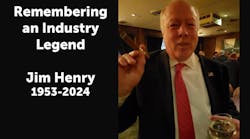If bad publicity could be converted to dollars, the Transportation Security Administration would be so flush with cash it could forego congressional budget requests for years. Congress and the media have focused their ire on the ineptitude and alleged criminality of some airport screeners, to the exclusion of equally salient, yet less publicized factors. An accurate assessment of the current state of airport security requires an examination of the variety of issues that have contributed to its wounds.
In fairness to the TSA, it is important to remember that the agency was created in just 11 weeks following the September 11, 2001 terrorist attacks. Billie Vincent, an aviation consultant and former director of the FAA Office of Civil Aviation Security, noted that given the haste in which the Aviation and Transportation Security Act (ATSA) was drafted, passed and signed into law by President Bush, we should have expected problems to develop.
Management Turnover
Senior management turnover has been troublesome for the TSA. In May, President Bush nominated Edmund "Kip" Hawley to be the agency's new chief, which will make him the fourth new TSA director in as many years. What is interesting about the first three appointees-John McGaw, Admiral James Loy, and Admiral David Stone-is that the words "commercial aviation security" did not figure prominently in their professional backgrounds. Hawley, on the other hand, has been a member of the FAA Air Traffic Services committee.
Richard L. Duncan, CPP, aviation security director at the Hartsfield-Jackson Atlanta International Airport, said these senior management shifts have had an impact on the overall interpretation of security policies and procedures at his airport.
"In the early phases of the TSA, they were heavily pushing a law enforcement type of agency," said Duncan. "Today they have started focusing on the things they do best, which is passenger and baggage screening activities."
These frequent changes in management and their accompanying policy shifts sometimes present unexpected challenges to the rank-and-file screening personnel. For instance, during Admiral Loy's tenure, Transportation Secretary Norman Mineta pushed the TSA to get airline passengers through screening points in 10 minutes or less. Billie Vincent describes this mentality as "facilitation, not security."
"That has happened throughout the history of aviation security," asserted Vincent. "The moment the FAA used to try to do something meaningful, the airlines would say, 'Well, that will affect our bottom line,' or 'That will affect our customers' movement' and so on. And before they ever reached a good security measure, they were talking about how to compromise the process and get the people through quicker."
More-No, Fewer Screeners
Adding to the TSA's security woes was the initial rapid expansion and subsequent contraction of its screening program. Vincent said that in its short history, the agency has "located, tested, hired, trained and indoctrinated over 60,000 persons in less than one year. It has also lost some 10,000-plus employees after having ramped up to an initial employment level beyond its congressionally authorized strength." The remaining 45,000 screeners now appear to be stretched too thin, and some federal security directors at busier airports are requesting additional personnel.
"Congress limited the TSA to 45,000 screeners in 2001, and that cap has not changed," said Duncan. "We're now into 2005, and if you look at Atlanta, our traffic has increased tremendously. In 2004 we did 83.4 million passengers, but there has been no growth in the TSA workforce at airports. In fact, TSA is threatening to cut screeners based on Congressional limitations."
This led to charges from individual screeners that the mandated three-hour-per-week training they were supposed to receive was more like a few minutes. Their concerns were validated in a report issued by the General Accountability Office in May. It states that almost half of the local TSA managers reported that there was not sufficient time for screeners to receive recurrent training within regular work hours because of understaffing.
Crossed Wires
It is important to understand that federal security directors and aviation security directors serve different functions at the same airports. The FSD works for the TSA and is responsible for the screening of passengers and bags. Conversely, an ASD like Richard Duncan works for the Department of Aviation for the local authority-in Duncan's case, the City of Atlanta-and has responsibility for ensuring the safety and security of persons at the airport and preventing unauthorized items getting to the aircraft. This overlap means that sometimes information such as screener performance is not disseminated from the FSDs to ASDs.
"We talk about screener performance," said Duncan, "but the FSD is not obligated to provide detailed information to the airports about how well the screeners are performing."
Given these concerns, what is the current status of airport security in the United States? Let's begin with the screeners, who are the easiest target of critics.
Screening Improvement
Despite all the bad press, there has been considerable improvement in the TSA's screening program since 9/11.
"Screener performance is still lacking in what it should be," said Vincent. "But it is far superior now to what it was (when the TSA took over). The next question one has to ask: Is it what it ought to be? And the answer is unquestionably no."
Richard Duncan added, "There is a difference in the quality of employees at the checkpoints. The TSA workers are better trained coming into the job."
Some have remarked that the screening system relies too heavily on technology. Vincent believes that you cannot build an effective screening system if you do not first build a good people system.
"You first start by selecting the right people, give them the right training, the right supervision and technology. And not just any technology, the right technology. Too often the solution to everything is technology."
The major problem with screening is the expectation that technology or screeners alone can prevent 100% of weapons and other dangerous items from entering sterile areas and airplanes. They can't-not alone, that is. "That is why you build a layered system," said Vincent. "You have to have the right procedures and processes, but no layer is going to be 100%."
Vincent suggests several enhancements to the screening program:
- Accelerate the training and deployment of pilots with guns (in the United States).
- Accelerate the enhancement of explosives detection systems by removing them from airport lobbies and incorporating them into the airports'/airlines' conveyor systems.
- Install covert CCTV throughout aircraft passenger cabins for viewing in cockpits.
- Design and implement a three-stage vehicle surveillance, assessment, inspection and barrier system to address the potential use of suicide vehicle-bomb attacks against airport terminal buildings.
- Screen all persons (including crews, employees and staff) and inspect their accompanying articles whenever they attempt to enter a restricted area.
- Accelerate R&D for enhanced explosives detection systems for passenger screening.
Vincent considers the implementation of the surveillance, assessment and barrier system to be one of the most critical elements in airport security today. However, resistance is inevitable because of the cost, the disruption and the lack of a specified threat.
"That's going to come from the airports, that's going to come from the airlines, that's going to come from people who are dissatisfied that someone is interrupting their routine. None of us want it," said Vincent, "but the consequences of not doing it are horrendous."
Eric Harne, CPP, is the principal consultant for Harne and Associates, a firm that specializes in security management communications. He has written extensively on a variety of issues in the security industry. Mr. Harne can be reached at [email protected].

